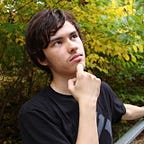My Common Application Essay
Prompt: Some students have a background, identity, interest, or talent that is so meaningful they believe their application would be incomplete without it. If this sounds like you, then please share your story.
I am a hacker. I like to find new ways to solve problems by experimenting with technology and testing the limits of what it can do. Recently, I wrote a C program to discover how numbers are represented as groups of bytes in my computer’s memory, which varies from system to system. However, hacking is not only about using the coolest new technology, nor is it only about computers. Hacking is an open and creative way of thinking that leads to unconventional ideas and can be ported to any craft. Hacking is how I approach life.
I first heard the word “hacker” in its non-pejorative sense during sophomore year, when I started taking computer science classes at Stuyvesant. I wondered why many programmers were calling themselves “hackers” when I had only heard it used for cybercriminals. Intrigued, I googled “hacker” and discovered that hackers are explorers and problem solvers who are always advancing knowledge in new directions. I realized that I already had a hacker ethic and was inspired to explore it further.
My quest to develop my hacker spirit led me to an essay about math as an art form. Unsatisfied with in-class exercises, I was excited to hack math. As I explored the malleable world of mathematics, I realized that examining the abstract, interrelated objects of this world is liberating and risk-free. For example, I can create a gravitational field in which the vectors swirl around like Vincent van Gogh’s Starry Night, instead of pointing straight inward as they do in the real universe. I want to see what will happen when I send an asteroid spiraling through my creation. I keep the basic laws of motion the same but use them differently. I can create my own set of axioms and see where they lead, or I can make everything fall apart by creating a paradox. At worst, I just have to rebuild my world from scratch. Either way, I learn something.
As I began to understand hacking more, I realized that I can hack the arts as well. I have random bursts of artistic inspiration throughout the day. I write a lot, so they often manifest as wordplay and tricks with sentence structure. Wordplay excites me in part because it taps into my mathematical side: I am traversing a graph of related concepts and looking for unusual relationships to wire together into puns, rhymes, and alliterations. I often use the distributive property to create parallel constructions by multiplying a subject by the sum of two predicates, or to condense two sentences containing the same subject into one by factoring.
I also realized that hacking gives us the freedom to think about social issues in new ways. As creative and nimble thinkers, we are more compassionate and more open to progress. Consequently, we become responsible for applying our knowledge and unique ways of thinking to the greater good, often combining seemingly unrelated ideas, inspiring solutions to poverty, global warming, and other social issues. For example, my idea to put thin-film photovoltaic cells into sunglasses would capture harmful ultraviolet rays, which contain more energy than visible light, and convert them into electricity. This device would empower individuals to generate their own energy, and to get as much of that energy as possible, we would go outside more, thus becoming healthier. This trend would spark an energy revolution in which a suite of wearable power sources enables each of us to use the energy in our bodies and surroundings.
By looking at life through a hacker’s lens, I free myself from the constraints on my thinking. I become more willing to take risks and embrace change, which keeps me engaged in living and learning.
Copyright © 2015 by Aidan Fitzgerald. All rights reserved.
